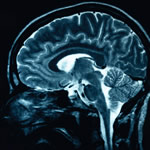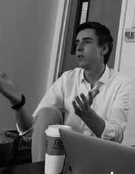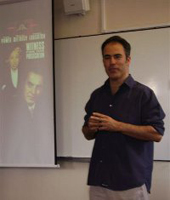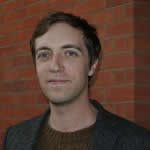
Prof. Ulrike Hahn
My research typically involves both experiments and modelling. I have worked on similarity, categorization, psycholinguistics and language acquisition, but mostly I now work on human rationality.This involves work on argumentation, evidence evaluation, reasoning, as well as judgment and decision-making. And it involves research both on normative question about what people rationally ought to do, and descriptive questions about what they actually do. I’m interested in rationality in both individual and collective contexts, and I am particularly interested in testimony and the role of social networks on the accuracy of our beliefs.

Prof. Mike Oaksford
My research concerns how people reason and construct arguments in discourse.
From a logical point of view, people seem to make many errors and biases in their deductive reasoning. However, from a probabilistic point of view, these ‘errors’ are the rational result of people being more sensitive to the strength of an argument defined using Bayesian probability theory rather than to deductive validity.
This approach can also be generalised to account for the differential strength of the informal argument fallacies that have accrued in logic text books since Aristotle. This research involves experimental work and modelling the resulting inferential behaviour. I am also interested in how the emotions, both experienced and anticipated, affect people’s reasoning and decision making.

Florian Steinberger
Florian’s main research interests lie at the intersection of (formal) epistemology and the philosophy of logic (in particular, the question oft he normative status of logic and its relation to other epistemic norms and to rationality more broadly), as well with the philosophy of language.
He also maintains an active interest in the philosophy of mathematics (logicism, intuitionism), metaphysics (realism/anti-realism), Frege and (increasingly) Carnap with occasional forays into the philosophy of religion.

Kristoffer Ahlstrom-Vij
Kristoffer Ahlstrom-Vij is a Reader in philosophy. He is also Research Tutor and MA Admissions Tutor. Before joining Birkbeck in 2017, he taught for five years at the University of Kent, Canterbury. Prior to that, he held post docs at Rutgers University and the University of Copenhagen, and did his graduate work at the University of Massachusetts, Amherst.
For more information, please visit Kristoffer’s website at http://www.ahlstromvij.com.

Germaine Symons
My research interests are most concerned with understanding the processes that support scientific reasoning, and working out how we can use this understanding to inform science teaching at primary, secondary, and tertiary levels of education. I believe we need to improve science teaching, where, currently, many children are leaving school without the scientific reasoning skills that allow us to make good decisions in a world increasingly dominated by ‘evidence based policy’.
My current research focuses on understanding how adults and children incorporate source reliability into their reasoning about causal systems (understanding how causal systems work is the goal of science). Most information regarding the world at large comes via a source, such as testimony from the people around them (e.g. parents, teachers, peers) or other forms of culturally transmitted information (e.g. books, the internet, television, newspapers). This information can be more or less reliable. For example, a scientific report would be a more reliable source of information compared with a newspaper article (on the same topic). For children, a teacher would be a more reliable source of information than a peer (in most cases!). Understanding at what age children start to take account of source reliability, and how they incorporate this information into their reasoning as they move into adult is one important aspect in understanding the processes that support scientific reasoning. For children, we use a Cars on Slopes game and ask children to make predictions about how far they think the car will go, and explain why they think that. The children are also given information that relates to the game, from more and less reliable sources, and see how this affects their predictions and explanations.

Kirsty Phillips
Research Assistant to Ulrike Hahn, collaborator to the BARD (Bayesian Arguementation via Delphi). Recently graduated University College London with a Distinction in Research Methods in Psychology, Msc. Previously worked as an Honorary Assistant Psychologist, NHS, after graduating from Warwick University with a First Class degree in Psychology, BSc (with Honours). Has completed research investigating various fields including phenomenology and content of voice hearing, attitudes towards mental health conditions, and different aspects of attention biases in relation to emotionally valenced stimuli.

Marko Tesic
My current research revolves around the following three topics: (i) explaining away, (ii) inference to the best explanation (IBE), and (iii) opinion dynamics. (i) How do people reason in situations in which two independent causes compete to account for an effect that both could have produced? After finding out that one cause has occurred and thereby explained away the effect, how likely do people think is that the other cause has also occurred? Experimentally testing how both individuals and groups reason in these kinds of situations should lead to a better understanding of the reasoning processes involved, which in turn could suggests ways to improve people’s reasoning in the case of explaining away. (ii) IBE is a form of non-deductive reasoning that plays a crucial role in both scientific and everyday reasoning. Despite this, there is no broad agreement on the normative status of IBE. Employing the framework of Bayesian epistemology, the goal here is to provide conditions under which IBE is a sound inference. (iii) How do people in a group discussing a certain issue and willing, possibility to different extents, to revise their opinions on the issue in light of the opinions of others in the group change their opinions? The challenge here is to provide agent-based models of opinion dynamics and to try to answer more specific questions such as: Does the opinion dynamics stabilize? Are there conditions under which agents reach consensus? If so, how long does it take agents to get to the consensus?

Jason Burton
I am a PhD student supervised by Prof. Ulrike Hahn (Birkbeck) and Dr. Adam Harris (UCL).
My research examines how digital information environments and social networks affect our ability to form accurate beliefs. I approach this topic by studying (1) how people update their beliefs in light of new information, (2) how information is shared and communicated online, and (3) how the structure of people’s social networks influences what they believe to be true. In doing so, I combine behavioural experiments, computational modelling, and analyses of digital data traces.
ReAL Affiliates

David Lagnado
My research focuses on the psychological processes that underlie human learning, reasoning and decision-making.
A major theme is the central role played by causal models in cognition. I investigate how people learn causal models from uncertain data, and how they use these models to draw inferences and make decisions. I have extended this work to the area of juror decision-making, showing that people use their causal knowledge to organize legal evidence and make decisions. I am currently developing a general framework for evidential and legal reasoning, and studying the dynamics of jurors’ beliefs across the course of a trial.
Another key theme in my research is the interplay between causal thinking and judgments of responsibility. I examine how people use causal models to attribute responsibility and blame, both with normal and patient populations. In a parallel stream to my work on causality, I have applied novel methods to explore the dynamics of probabilistic learning, and contributed to the study of impaired learning in Parkinson’s patients.

Toby Pilditch
Toby is a Research Associate in Experimental Psychology at UCL. He currently works in the domains of evidential, probabilistic, and causal reasoning, as well as belief updating and cognitive biases. Toby works on applying Bayesian networks to improve reasoning in the domain of Intelligence Analysis for the (IARPA), in the BARD project team.
He also maintains an active interest in building psychologically informed Agent-Based Models, exploring the intersection of cognitive science and dynamic, complex systems. Toby is an associate member of the Complex Human-Environmental Systems Simulation Laboratory(CoHESSyS) at Oxford University.

Stephen Dewitt
Stephen Dewitt is a Research Associate in the Experimental Psychology Department at UCL. He is part of the translation team for the Bayesian ARgumentation via Delphi (BARD) project team and is currently examining the role of prior judgements and prejudice on the incorporation of ambiguous evidence into belief structures. He is also investigating the impact of the surprisal value of evidence on belief updating and the degree to which the incorporation of surprising evidence is undertaken according to normative standards.

Alice Liefgreen
I completed a BSc Psychology at the University of Bath, which included a 1-year work placement within the clinical forensic psychology team in a prison. Subsequently I completed the MSc Cognitive Neuroscience at UCL and continued working as research assistant within the Memory and Space lab in the year following graduation. I am currently undertaking a PhD supervised by Prof. Lagnado, within the Experimental Psychology department at UCL. Research interests include investigating the psychological processes underlying evidential and causal reasoning, as well as developing a normative framework for optimal information search strategies in a range of contexts, including forensic.
ReAL External Collaborators

Dr. Marion Vorms
My research is at the crossroads of the philosophy of science, epistemology, and the psychology of reasoning. My current project is to study the notion of ‘reasonable doubt’, both as a standard of proof in the judicial context, and as a norm of reasoning in other (scientific, forensic, policy-making, as well as everyday) contexts. The main goal of this research is twofold. On the one hand, I aim at studying the epistemological norms of reasonable doubt. On the other hand, I work towards developing an empirical research programme, testing the effects of the consequentiality of epistemic decisions on reasoning. I am running this project under the supervision of Prof. Ulrike Hahn (Birkbeck), in collaboration with Dr. David Lagnado (UCL) and Dr. Adam Harris (UCL). It may involve further collaborations, in particular with legal scholars and forensic scientists.

Dr Nicole Cruz De Echeverria
I investigate reasoning with uncertain premises. In particular, I look at how the subjective probabilities of premises and of premise elements, as well as whether an argument is probabilistically valid, affect the inferences people draw.

Igor Volzhanin
My research focuses on a broad topic of feedback loops and their impact on decision-making. The objective of my PhD is to produce a detailed account of the fundamental nature of feedback loops, with the focus on understanding why they exert such a powerful influence on individuals, with the purpose of deriving effective strategies to break loops that cause negative behaviour, while promoting loops that produce positive behaviour. The problem with ‘runaway’ feedback loops can be observed in many daily situations, from stock-market bubbles to cycles of violence, to addiction and self-fulfilling prophesies. I am interested in the human cognition mechanisms, as well as social behaviour that prevent individuals from making rational calculations, and instead force them into perpetually harmful cycles.

Simon Hall
I am researching whether people see causes and effects in the world even when there is no evidence for causal structure. In addition, I am looking at how, when people reason together, they must keep track of what each person knows in order to understand why a statement has been made. For example, is a conditional statement understood in light of the pragmatics of language use, as well as semantics and syntax?

Dr. Jens Koed Madsen
My research takes point of departure in the psychology of persuasion.
Persuasion (understood as the communicative act of changing someone’s beliefs with a persuasive intention so as to differentiate it from information updating) is a persistent and ever prevalent social phenomenon. In the past years, I have explored the cognitive psychological foundation of persuasion and developed a model that describes how humans approach uncertain information from uncertain sources in situations where deception and manipulation is an ever-present possibility.
I approach persuasion from an argumentative perspective, relying on subjective, probabilistic estimations of likelihood (from a Bayesian perspective) to describe how humans estimate the strength of the argument as well as the credibility of the source (in terms of trustworthiness and expertise).

Christopher Brand
My current research project is investigating how people reason about moral situations. Why is it that in some circumstances we find it acceptable to allow one person to die so that others might live, yet in others we do not? Why do we feel an obligation to save a child drowning in front of us, but not one starving to death a million miles away? Why do we vote for the political parties that we vote for? My work focuses on the idea that a significant factor in these decisions is our causal representation of the world, and – more specifically – how likely we think certain outcomes are based upon our prior experiences. Using a combination of behavioural and computational methods, I’ve been gathering evidence to support this view.

Dr Peter Collins
My research focuses on framing effects in judgement, decision-making and reasoning. When people make judgements and decisions, and when they reason, they can be influenced by the way information is represented. Such framing effects strike some researchers as being irrational (e.g. Kahneman, 2011) and others as being useful ‘mental tools’ (Gigerenzer, 2003). I plan to explore how far framing effects can be regarded as mental tools for inferring implicit, intended information. My research will draw on methods in experimental pragmatics, in which field researchers study how speaker-hearers convey and interpret implicit meanings. Current projects include a study of evidential language. Plans include studies on metaphor, source reliability, and Schwartz’s circular model of values (Schwartz, 1992). I hope, throughout, to explore applications to health communication.
